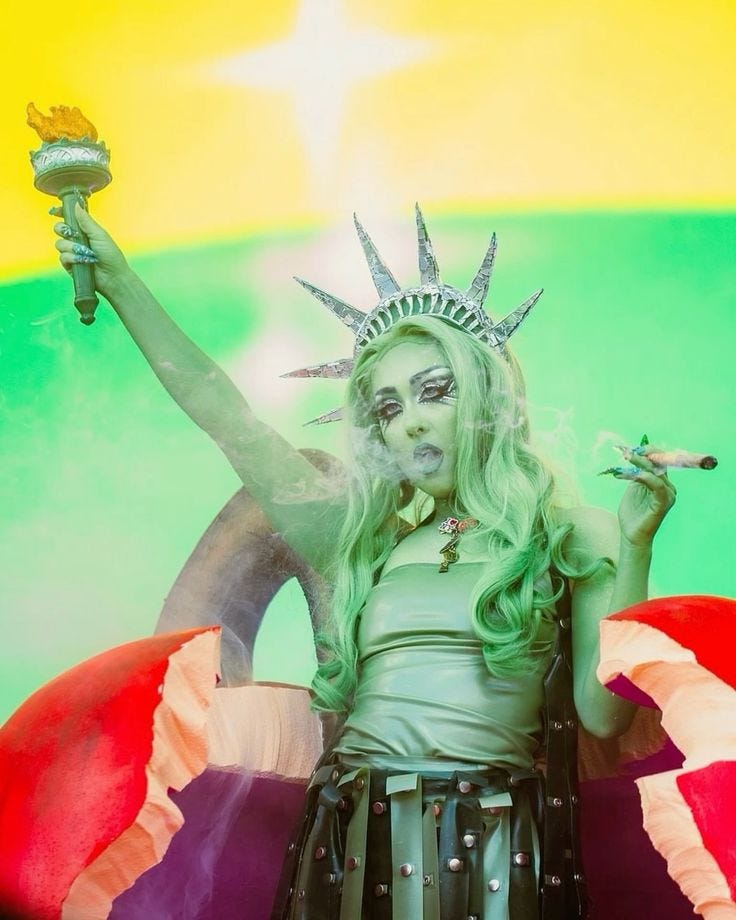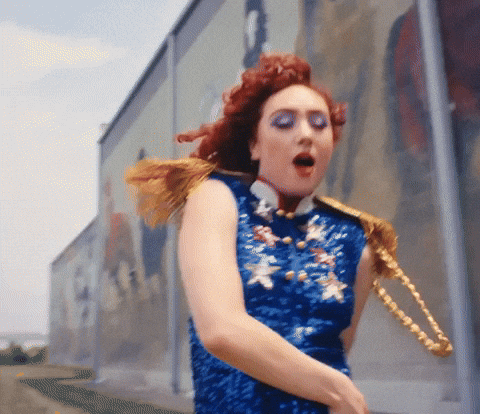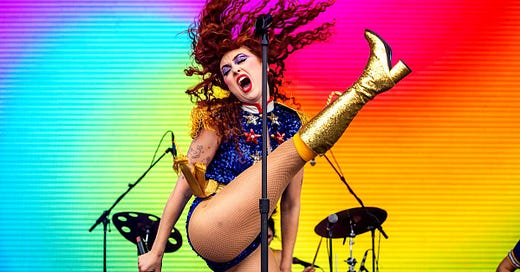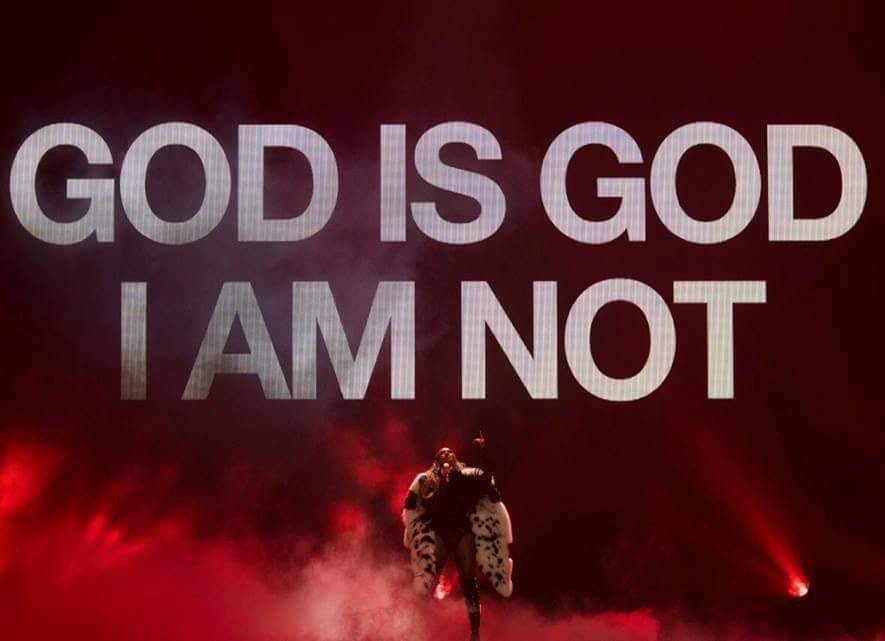three quick little updates:
(1) if you have any interest in reading my fiction, i have a short story entitled “jack on the roof” featured in the fall issue of The North American Review! it is only in print at the moment, but you can order a copy if you want to here.
(2) i had the opportunity to interview the incredible Kim Liao for Hippocampus Magazine! we discussed her debut memoir, Where Every Ghost Has a Name: A Memoir of Taiwanese Independence, which i cannot recommend highly enough. i hope you’ll check out her book and our interview.
and (3), i’ve updated the look of my substack! we love a fall refresh! let me know what you think of the new banner and logo <3 the inspiration was 90s scratch art, because of course it was.
This past June, I saw a princess out in the wild.
Specifically, our one and only Midwest Princess, Chappell Roan. She was attending Brooklyn Pride with her signature Little-Mermaid-red-hair covered by a wig and kerchief. She was surrounded by friends and obviously trying to keep a low profile.
My friend and I spotted her as we watched the parade because she was relatively close to us. Someone near us whispered that they had googled her tattoos and could confirm it was really her. Thankfully, the few folks around her who’d figured out who she was were not making a big scene out of it. Which was pretty remarkable, considering the fact that she’s queer royalty. Because if the larger crowd had realized who she really was, she was going to be mobbed. Chappell Roan deserved to blend in and enjoy Pride; or at least, that’s what I told myself, even if I did catch myself staring one too many times.
I received absolute confirmation the next day that the person I saw at Pride was Chappell, because she delivered her now-infamous Governor’s Ball performance, dressed as Lady Liberty while entering the stage from a big rotten apple as she smoked a giant blunt.
And that, ladies, theydies, and gentlethems, is America’s People’s Princess.

Chappell Roan’s sudden catapult to fame is the stuff of a uniquely 21st-century American pop culture fairy tale. Roan, whose real name is Kayleigh Rose Amstutz, is a native Missourian who has been slowly gaining a cult following over the past ten years, known for her artful lyrics about queerness, dating, and yearning, not to mention her high femme drag persona on stage. Despite being dropped by her original label in 2020, which forced her to move back in with her parents in Missouri and work at a drive-thru, Roan has had a meteoric rise over the past ten months, though “meteoric” at this point sounds like an understatement now. Her music has earned the admiration of many pop music bona fides like Elton John and Lady Gaga, who have made clear that they see Roan as the future of pop, specifically queer pop (sorry Jojo Siwa).
Roan has spoken out, however, to ask for her fans’ most extreme invasive behavior to stop. She has shared, most explicitly in her recent Rolling Stone profile, that she’s already contended with a stalker and “fans” who have followed her family around. And for this, she has received backlash from parts of her fanbase for not appreciating their love for her. Video of her crying in the middle of one of her performances surfaced earlier this summer; she apologized to the audience for “not feeling like herself” and told them that the reality of her newfound fame has been hard for her handle. The audience cheered her on, but it’s obvious from the look on her face during this moment that she’s so worried about fucking it all up, no matter how diehard her newfound fans claim to be. And I don’t blame her. This has been particularly devastating for her given her candor when talking about living with bipolar disorder II.
Her anxiety has been, in other words, through the damn roof since this fame found her.
I’m not going to sit here and pretend like I can understand that kind of anxiety and public scrutiny. I sure as hell can’t. The only people who can are the “girl’s girls” celebrities (as Roan referred to them), like Billie Eilish, the members of boygenius, Mitski, and Charli XCX, who reached out to help emotionally support her (all of whom Roan mentions in the Rolling Stone profile).
This kind of fame is hard to imagine and empathize my way into, but that doesn’t stop me from ruminating on it. It’s a human experience that feels so singular and so fascinating at a distance, that only a handful of people can ever say that they have truly experienced.
The closest I can come to this from my own very limited vantage point? I can think of times where I felt surveilled or watched or heavily scrutinized. Times when someone has expressed an unsolicited and unwelcome comment on my body. I can think of times when my writing has been flamed online in the comments section.
But I’m not a public figure. I don’t have entire subreddits devoted to my existence that dissect my every move.
What I’m describing here is, of course, the pitfalls of a parasocial relationship. Yes, “parasocial” is a buzzy word right now. But for the uninitiated, Cambridge Dictionary defines it as:
“involving or relating to a connection between a person and someone they do not know personally, for example a famous person or a character in a book”
The important thing to note here is that parasocial relationships are always one-sided in nature. Social media, though, fuels the obsession and entitlement of those experiencing parasocial obsessions in a way that no other media truly can.
We all experience a parasocial relationship at some point in our lives, whether it’s an athlete you love to yell at on your TV screen; a singer-songwriter you feel like would be your best friend under different life circumstances (*cough* Swifties, I’m looking at you *cough*); or an influencer whose content you’ve seen so much of you’re certain you know everything there is to know about them.
And of course you don’t. We all contain multitudes; of course Roan contains multitudes herself.
I’m guilty of parasocial relationships and obsessions, but perhaps “guilty” is the wrong word here, because it implies that there’s something wrong with feeling a connection to a public figure. And I’m not sure that that’s true.
As Roan says, we aren’t entitled to her 24/7 just because she’s famous. But she’s also an artist who makes work that, I would imagine, she hoped would connect with people. There’s nothing wrong with sharing in a larger experience with the artist and her fanbase, so long as it’s respectful of that fact that Roan is, like you and me, a creature made of flesh and blood. She has needs. And sometimes that need is can everyone please leave me the fuck alone?!
Writer Angela Haupt describes her own rollercoaster of celebrity worship for TIME Magazine in her essay, “In Defense of Parasocial Relationships.” She specifically uses the example of her parasocial relationship with the 00’s pop-punk-emo-piano god Andrew McMahon, frontman of Something Corporate and Jack’s Mannequin.
Haupt interviews McMahon about his experiences with rabid fans. While he’s profoundly appreciative of his fanbase over the years, the parasocial connections that fans feel also creates a transactional relationship that is, for lack of a better way of putting it, way beyond the scope of what any singer-songwriter and musician is equipped to handle:
Of course, there’s always a line. When I asked McMahon what his was, he first provided the diplomatic response: Because he’s available to fans on social media, they sometimes treat him like customer service, inquiring about ticket problems or why he didn’t book a show in their city. After digging deeper, he raised the fact that he’s had people reach out to him while in life-threatening crisis. ‘It’s hard to figure out how to deal with that,’ he says. ‘Those are the scariest things because I think there’s a level of personal responsibility. I don’t say that as a way to discourage somebody, but that’s the moment where it flips into a situation where it’s above my pay grade.’”
I wouldn’t be able to handle that. And I’d imagine this sense of responsibility towards fans skyrockets for folks from marginalized groups like Roan. Particularly when I consider just how much the queer and trans community now worship her.
A part of me felt horrifically guilty after seeing Roan in person because I know I likely wasn’t as slick as I thought I was. I’m sure she knew people were staring, myself included (especially when one of her signature red curls cascaded out of the wig).
When she took to social media to post a public takedown of fans’ creepy behavior later on in the summer, I felt implicated somehow (classic millennial move, making it all about me). Even though compared to the examples she cited, my non-interaction with her in the real world was…well, not a real interaction.
I was still anxious though. Had I crossed a line by looking? Did I overstep a boundary by whispering with my friend and speculating if that was truly her, hiding beneath a wig? Perhaps I did.
That part of me also feels ashamed even writing and publishing this newsletter. What’s the point in me sharing that I saw her out in public undercover? Is that really a flex? What do I hope to gain from writing about this? Clout? A shred of street cred? From who? Do any of us really care whether you’ve seen a celebrity in person or not?
I am choosing to publish this draft despite these anxieties because I figure if I’m renegotiating my own parasocial relationships, maybe someone else is too. And what I am taking from watching Roan this year is this: we could all stand to do a little self-interrogation around our one-sided fixations, however innocent they might seem. Parasocial connections aren’t all sinister, but we also shouldn’t let them blossom within us without checking in with ourselves about what sorts of connections we actually want in our lives, ones with real people in our real vicinity. Ones that aren’t based solely on one-sided worship.
As Beyonce once said: “God is God. I am not.”
When I go back and analyze just the facts of my non-encounter, it seems pretty straightforward. I wasn’t asking Roan, as McMahon’s fans have, to help me while I was in the midst of a personal crisis while she was attending Pride. I chose not to talk to her or bother her. At all.
And I’m not exactly Substack royalty. It’s not like me writing about her is going to move the needle regarding her fame and popularity.
Truthfully, the guilt is, I think, tied to a younger version of me. That younger iteration of myself might have tapped on her shoulder to say hi. A younger version of me would not have taken the time to step back and interrogate the dynamics at play for someone like Roan attending Pride in a major city. I have, admittedly, been starstruck in New York City before and not always been as cool as I could have been. I’m not proud of that. But I’ve also grown.
My anxiety around my parasocial connection to Roan isn’t based in real evidence of my wrongdoing, but the guilt and shame I carry from previous encounters, where I did not respect someone’s privacy in the way I might have wished if the situations had been reversed.

Of course, what we see of Roan is what she allows us to see. That doesn’t mean we’re entitled to her time, or the most intimate details or her life. Hell, we’re not entitled to another album either, if she decides to quit music (but oh man, I selfishly hope there’s more music where this came from). And we as fans are certainly not entitled to the private business of her family and her loved ones. To be clear: some of the “fans” engaging in this behavior are folks who are very mentally ill and in need of help (in fact, this level of pathological celebrity worship can even be measured by psychologists).
But for the otherwise mentally able fan: if you love an artist, why would you want to create a situation where they feel scared and unsafe? Why increase their anxiety? What does that give you, besides a shred of clout and a (likely mediocre) story to tell?
Roan owes me nothing. She didn’t at Pride, and she doesn’t now. All I have is my own mediocre story from having sighted her, a story to tell at parties to fill an awkward silence. It’s the narrative equivalent of trying in vain to cup water in my hands.
If anything, I just owe her my gratitude. My dog, however, whom I have scream-sang “Casual” to no fewer than a hundred times this past summer, might have a bone to pick with her (pun intended).
With all that said…if you’re looking for me, I’ll be at the Pink Pony Club with all my fellow pink pony princesses.
Roan, however, will likely not be in attendance.






